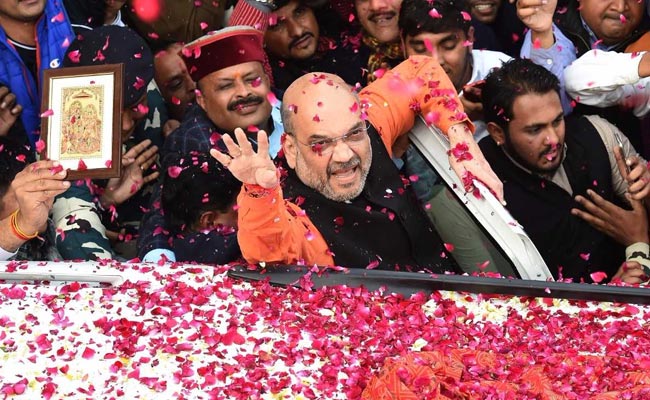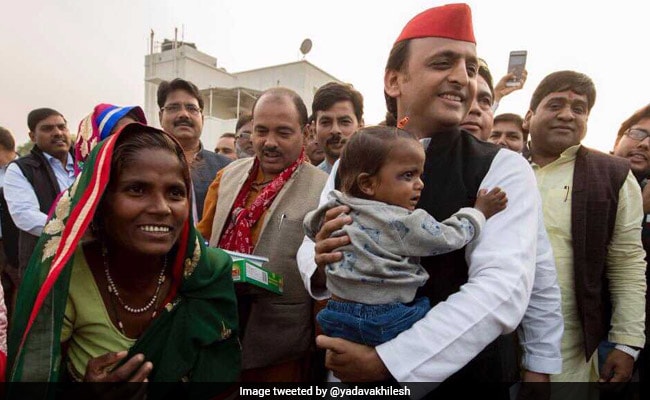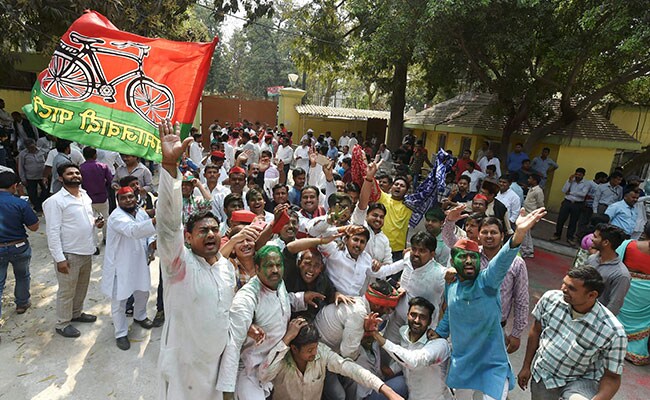
BSP chief Mayawati needs the Rajya Sabha win to boost her bargaining power for 2019
- Rajya Sabha elections for 10 UP seats with 11 candidates
- BJP puts up 9 candidates, 1 each for Mayawati, Akhilesh Yadav
- Mayawati's candidate in jeopardy, BJP moves to spoil her chances
Did our AI summary help?
Let us know.
After his mission to deny Ahmed Patel re-election to the Rajya Sabha flopped last year, Amit Shah has a new target: Mayawati's Bahujan Samaj Party or BSP. On Friday, Uttar Pradesh will decide 10 of its 31 seats in the Upper House. Till just hours before nominations closed on the 12th, there were 10 candidates for the 10 seats - 8 from the BJP and one each from Mayawati's BSP and Akhilesh Yadavs's Samajwadi Party or SP.
Each of the three parties was confident.
To win, a candidate must get the votes of 37 MLAs or state legislators. The BJP has more than 300, so its eight candidates were safe. The SP, with 47, had 10 to spare. Mayawati had 19. The Congress said its seven MLAs would support her candidate. Now she needed 11 more - the SP said it would give her its surplus 10 and Ajit Singh's party loaned her one more. So her candidate would make it.
Not if Amit Shah could help it. A series of nth-hour manoeuvres saw an extra or 9th BJP candidate entering the contest. This meant that it was Mayawati, who had the least votes, who was in jeopardy.
The competition is now between her candidate - a Dalit and former MLA called Bhim Rao Ambedkar and the BJP's Anil Agarwal, an upper caste industrialist.
Amit Shah then welcomed serial defector Naresh Agrwal - who has served with the Congress, the BSP and most recently, the SP. Naresh Agrwal's son is an SP legislator - the arrangement with the BJP makes it incumbent upon him to vote for its candidate. That means Mayawati is at least one vote short (remember she was getting 10 from the SP).
 After that stealth attack of sorts by Amit Shah, the Congress and the SP have been worried about more exits - or cross-voting. The BJP, on the other hand, is on a treasure hunt for legislators who can be 'persuaded' to defy their parties and vote for its ninth candidate. Amit Shah calls it "political manoeuvring".
After that stealth attack of sorts by Amit Shah, the Congress and the SP have been worried about more exits - or cross-voting. The BJP, on the other hand, is on a treasure hunt for legislators who can be 'persuaded' to defy their parties and vote for its ninth candidate. Amit Shah calls it "political manoeuvring".
The Congress is confident that its seven MLAs will follow instructions, but Akhilesh Yadav's party is more vulnerable. At least seven of its 47 law-makers who are loyal to his uncle and long-time critic Shivpal Yadav could vote against their own party - and/or Mayawati. This was witnessed last year when the same group crossed the line to back the BJP's candidate for President of India, Ram Nath Kovind.
Samajwadi leaders say the Yadavs have settled their family dispute, forging a new solidarity within party workers. "The feud is a thing of the past,'' proclaimed influential SP leader Rajendra Chowdhury. "Even Shivpal-ji has acknowledged his nephew's hard work."
But it is not the family's somewhat forced cohesion that's serving as glue within the SP. Just weeks ago, Akhilesh Yadav persuaded Mayawati to abandon a 25-year rivalry with his father; she supported his candidates in crucial by-elections for two parliamentary seats of gigantic importance - they were held by Chief Minister Yogi Adityanath and his deputy, Keshav Prasad Maurya.
 The combined force of the SP and Mayawati's supporters defeated the BJP in a radical shift for the opposition's strike rate in recent elections. "Our spectacular performance in the Gorakhpur and Phulpur by-elections has put Akhilesh Yadav firmly in control of the party and the victories will certainly impact the decision of anyone who was thinking of rebelling," claimed Rajendra Chowdhury.
The combined force of the SP and Mayawati's supporters defeated the BJP in a radical shift for the opposition's strike rate in recent elections. "Our spectacular performance in the Gorakhpur and Phulpur by-elections has put Akhilesh Yadav firmly in control of the party and the victories will certainly impact the decision of anyone who was thinking of rebelling," claimed Rajendra Chowdhury.
With those electoral victories as enormous teaching moment, Akhilesh Yadav and Mayawati and their teams have presumably recognized the worth of sticking together. Which is why the SP hopes its legislators will not turn rogue in the Rajya Sabha election.
The BJP's final entrant, Anil Agarwal, goes into the election with his party's residual 28 votes; he needs just nine more to keep the BSP out. The party also has the support of three independents and a prospective turncoat in Vijay Mishra, the lone lawmaker from the NISHAD party, which rests on a support base of fishermen who form about 4% of the state's population. Vijay Mishra, known as a local strongman, had represented the SP thrice as a law-maker till Akhilesh Yadav refused to let him contest last year's state election. He promptly joined the NISHAD party which was looking for contestants with money and muscle power who were sure shots. NISHAD party president Dr Sanjay Nishad told NDTV that his MLA would not betray the opposition on the Rajya Sabha vote, but Vijay Mishra is known to, given the choice, opt for self-interest.
This roiling of what lies beneath is a problem for the BSP, but it's not as if the BJP has its ducks in a row either. For its ninth candidate, the BJP is relying on two allies, Apna Dal and the Suheldev Bhartiya Samaj Party, which has a representative in Yogi Adityanath's cabinet.
 "We are allies, but our opinion is never sought on any important matter. No one from the BJP has approached us for our votes as yet, then how can they assume it's a done deal?" the minister, Om Prakash Rajbhar, told NDTV, though he has reportedly been persuaded into supporting the BJP st a meeting with Amit Shah today.
"We are allies, but our opinion is never sought on any important matter. No one from the BJP has approached us for our votes as yet, then how can they assume it's a done deal?" the minister, Om Prakash Rajbhar, told NDTV, though he has reportedly been persuaded into supporting the BJP st a meeting with Amit Shah today.
There are those who believe that before Amit Shah made his intention clear, Mayawati had calculated the possibility of defeat. By naming 52-year-old Bhimrao Ambedkar, a former MLA, as her choice for the Rajya Sabha, she surprised her own cadre. Her loyalists wanted her to run for the Upper House, which she quit dramatically last year, accusing the BJP of not allowing her to speak at length on outbreaks of violence against Dalits.
Some in the BSP thought that if not herself, she would pick her brother, Anand Kumar, for the solitary seat that the party is contesting. "Her insistence that Bhimrao Ambedkar was chosen for his commitment to the party has not fooled anyone. He is a relative lightweight in the BSP who lost in the 2017 assembly election,'' says Manish Gautam, a professor of Political Science at a Kanpur college and a BSP activist. "Mayawati-ji must have sensed that Amit Shah would pull out all the stops to defeat the BSP's candidate in the Rajya Sabha poll; so rather than take a personal risk, she opted for a more symbolic face."
The symbolism is heavy. The BSP nominee shares his name with Dr Babasaheb Ambedkar, the only pan-India Dalit icon. If he loses, Mayawati can claim that the BJP deliberately pitted Anil Agarwal, an upper caste candidate, against Bhimrao Ambedkar to humiliate the entire community. "At a time when attacks on Dalits in UP are on the rise and statues of Dr Ambedkar are being routinely vandalised, the charge will not only stick, but give a bigger push before the 2019 general election to the anti-BJP Dalit consolidation which is already happening on the ground," said Professor Gautam.
 For Amit Shah, the big dividend in defeating Mayawati will be realized if her new and very fragile bond with Akhilesh Yadav is short-circuited. She could end up blaming him for failing to keep his end of the deal after the BSP helped him win the Gorakhpur and Phulpur Lok Sabha seats. The BJP knows that a Mayawati-SP alliance for the 2019 election could be apocalyptic for its chances in Uttar Pradesh and a second term for Prime Minister Narendra Modi.
For Amit Shah, the big dividend in defeating Mayawati will be realized if her new and very fragile bond with Akhilesh Yadav is short-circuited. She could end up blaming him for failing to keep his end of the deal after the BSP helped him win the Gorakhpur and Phulpur Lok Sabha seats. The BJP knows that a Mayawati-SP alliance for the 2019 election could be apocalyptic for its chances in Uttar Pradesh and a second term for Prime Minister Narendra Modi.
The BJP and its allies bagged 73 of the 80 Lok Sabha seats in the state in 2014, but if Mayawati and Akhilesh Yadav's votes are combined, then constituency-wise data compiled by several agencies and reported in the media show that the BJP would lose nearly 50 of those seats.
Other parties are invested too. A triumph for the BSP in the Rajya Sabha cliff-hanger will exponentially boost opposition unity, impacting players like Mamata Banerjee and Telangana's K Chandrasekhar Rao; a defeat will reinforce that the BJP is still the meanest election machine in the business.
Each of the three parties was confident.
To win, a candidate must get the votes of 37 MLAs or state legislators. The BJP has more than 300, so its eight candidates were safe. The SP, with 47, had 10 to spare. Mayawati had 19. The Congress said its seven MLAs would support her candidate. Now she needed 11 more - the SP said it would give her its surplus 10 and Ajit Singh's party loaned her one more. So her candidate would make it.
Not if Amit Shah could help it. A series of nth-hour manoeuvres saw an extra or 9th BJP candidate entering the contest. This meant that it was Mayawati, who had the least votes, who was in jeopardy.
The competition is now between her candidate - a Dalit and former MLA called Bhim Rao Ambedkar and the BJP's Anil Agarwal, an upper caste industrialist.
Amit Shah then welcomed serial defector Naresh Agrwal - who has served with the Congress, the BSP and most recently, the SP. Naresh Agrwal's son is an SP legislator - the arrangement with the BJP makes it incumbent upon him to vote for its candidate. That means Mayawati is at least one vote short (remember she was getting 10 from the SP).

BJP chief Amit Shah is hoping to split the SP-BSP alliance
The Congress is confident that its seven MLAs will follow instructions, but Akhilesh Yadav's party is more vulnerable. At least seven of its 47 law-makers who are loyal to his uncle and long-time critic Shivpal Yadav could vote against their own party - and/or Mayawati. This was witnessed last year when the same group crossed the line to back the BJP's candidate for President of India, Ram Nath Kovind.
Samajwadi leaders say the Yadavs have settled their family dispute, forging a new solidarity within party workers. "The feud is a thing of the past,'' proclaimed influential SP leader Rajendra Chowdhury. "Even Shivpal-ji has acknowledged his nephew's hard work."
But it is not the family's somewhat forced cohesion that's serving as glue within the SP. Just weeks ago, Akhilesh Yadav persuaded Mayawati to abandon a 25-year rivalry with his father; she supported his candidates in crucial by-elections for two parliamentary seats of gigantic importance - they were held by Chief Minister Yogi Adityanath and his deputy, Keshav Prasad Maurya.

SP chief Akhilesh Yadav's legislators are less likely to cross-vote after the recent by-election victories
With those electoral victories as enormous teaching moment, Akhilesh Yadav and Mayawati and their teams have presumably recognized the worth of sticking together. Which is why the SP hopes its legislators will not turn rogue in the Rajya Sabha election.
The BJP's final entrant, Anil Agarwal, goes into the election with his party's residual 28 votes; he needs just nine more to keep the BSP out. The party also has the support of three independents and a prospective turncoat in Vijay Mishra, the lone lawmaker from the NISHAD party, which rests on a support base of fishermen who form about 4% of the state's population. Vijay Mishra, known as a local strongman, had represented the SP thrice as a law-maker till Akhilesh Yadav refused to let him contest last year's state election. He promptly joined the NISHAD party which was looking for contestants with money and muscle power who were sure shots. NISHAD party president Dr Sanjay Nishad told NDTV that his MLA would not betray the opposition on the Rajya Sabha vote, but Vijay Mishra is known to, given the choice, opt for self-interest.
This roiling of what lies beneath is a problem for the BSP, but it's not as if the BJP has its ducks in a row either. For its ninth candidate, the BJP is relying on two allies, Apna Dal and the Suheldev Bhartiya Samaj Party, which has a representative in Yogi Adityanath's cabinet.

SP and BSP workers celebrating their victory in Gorakhpur
There are those who believe that before Amit Shah made his intention clear, Mayawati had calculated the possibility of defeat. By naming 52-year-old Bhimrao Ambedkar, a former MLA, as her choice for the Rajya Sabha, she surprised her own cadre. Her loyalists wanted her to run for the Upper House, which she quit dramatically last year, accusing the BJP of not allowing her to speak at length on outbreaks of violence against Dalits.
Some in the BSP thought that if not herself, she would pick her brother, Anand Kumar, for the solitary seat that the party is contesting. "Her insistence that Bhimrao Ambedkar was chosen for his commitment to the party has not fooled anyone. He is a relative lightweight in the BSP who lost in the 2017 assembly election,'' says Manish Gautam, a professor of Political Science at a Kanpur college and a BSP activist. "Mayawati-ji must have sensed that Amit Shah would pull out all the stops to defeat the BSP's candidate in the Rajya Sabha poll; so rather than take a personal risk, she opted for a more symbolic face."
The symbolism is heavy. The BSP nominee shares his name with Dr Babasaheb Ambedkar, the only pan-India Dalit icon. If he loses, Mayawati can claim that the BJP deliberately pitted Anil Agarwal, an upper caste candidate, against Bhimrao Ambedkar to humiliate the entire community. "At a time when attacks on Dalits in UP are on the rise and statues of Dr Ambedkar are being routinely vandalised, the charge will not only stick, but give a bigger push before the 2019 general election to the anti-BJP Dalit consolidation which is already happening on the ground," said Professor Gautam.

A vandalised statue of Dr Bhimrao Ambedkar in a village in Azamgarh
The BJP and its allies bagged 73 of the 80 Lok Sabha seats in the state in 2014, but if Mayawati and Akhilesh Yadav's votes are combined, then constituency-wise data compiled by several agencies and reported in the media show that the BJP would lose nearly 50 of those seats.
Other parties are invested too. A triumph for the BSP in the Rajya Sabha cliff-hanger will exponentially boost opposition unity, impacting players like Mamata Banerjee and Telangana's K Chandrasekhar Rao; a defeat will reinforce that the BJP is still the meanest election machine in the business.
Track Latest News Live on NDTV.com and get news updates from India and around the world

